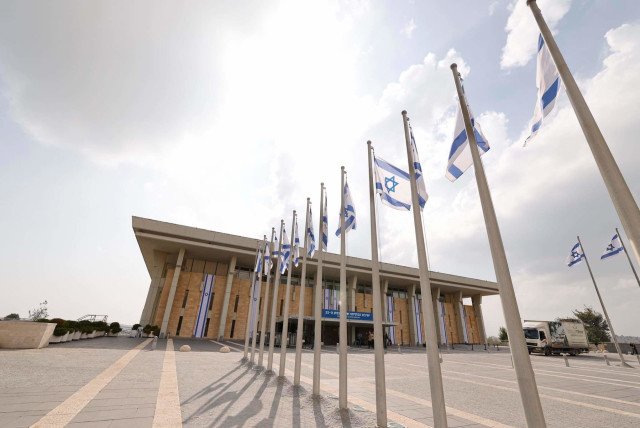Knesset committees to continue preparing series of controversial bills

The Knesset is set to advance a series of controversial bills this week.
The coalition will continue advancing this week a series of bills that have raised controversy in recent weeks.
The first bill is a softened version of a proposal to regulate the Israel Bar Accusation’s collection of mandatory membership fees.
The bill already passed its first reading in the Knesset plenum and is being prepared for its second and third readings in the Knesset Constitution Committee.
The proposal says that the IBA may only use budgets it accrued from membership fees for purposes deemed “essential” to IBA operations, such as producing the bar examination twice a year and managing the array of internships, and ban the use of these funds for purposes such as professional conferences or training.
Debates in the Knesset Constitution Committee led to a slight softening of the bill.
According to the current version, the committee may collect additional mandatory fees for purposes that are approved by the constitution committee. Other actions must be funded by voluntary fees or other income sources.
The bill’s author, MK Hanoch Milwidsky (Likud), and other coalition members have argued that the mandatory membership fee should not go towards “political” purposes. They gave as examples the IBA’s support and participation in protests against the judicial reforms in 2023.
However, IBA head Adv. Amit Becher, government and Knesset legal advisers, and members of the opposition, said the IBA was an independent organization that had the right to set its own fees without government intervention and that the coalition’s real purpose was to threaten the IBA with damaging legislation in an attempt to force its members on the Judicial Selection Committee to acquiesce to government demands.
The next bill set for its second and third reading
Another bill being prepared for second and third reading in the Knesset Constitution Committee is the so-called “Rabbi’s Bill.” The bill stipulates that the Religious Affairs Ministry may fund job openings in municipal religious councils in addition to the funds allotted to the councils in the national budget.
The additional jobs must be provided based on “equal criteria” set by the religious affairs minister after consulting with the finance minister. Constitution Committee chairman MK Simcha Rothman (Religious Zionist Party) encouraged the bill’s author, Shas MK Erez Malul, to give the finance minister veto power and not just require “consultation.”
Shas has argued that the bill’s purpose is simply to appoint rabbis and other religious service providers to cities and neighborhoods that currently do not have them.
The party has claimed that a majority of Israel’s Jewish citizens live in municipalities that do not have rabbis, which negatively affects the state’s ability to provide religious services.
Members of the opposition, some mayors, and even members of the coalition have argued that the bill was politically motivated and intended to grant lucrative jobs to members of Shas, which controls the religious affairs ministry.
A third bill
A third bill proposal set to come up this week, this time in the Knesset Home Committee, would expand the government’s power to prevent candidates or parties from running in elections due to expressions or support for acts of terror.
The current law states that individuals or parties cannot run in the nation’s parliamentary election if in its actions, objectives, or words it express “denial of the existence of the State of Israel as a Jewish and democratic state, incitement to racism, or support for armed struggle by an enemy state or terrorist organization against the State of Israel.”
The decision to disqualify candidates is made by the Central Elections Committee, in which the outgoing coalition has a majority.
The decision must be approved by the Supreme Court. Over the years, the court has rejected most of the committee’s decisions on the grounds that when it comes to speech, a “critical mass” of statements is necessary in order to disqualify a candidate.
The bill, sponsored by coalition whip MK Ofir Katz (Likud), amends the law by stating that the disqualification applies even when the statements in question were not “continuous.”
This means that one such statement made in the past can block a person or party from running for national office.
More importantly, the bill amends the process so that the Supreme Court does not have a priori veto power over disqualifications; rather, the power to disqualify candidates belongs solely to the Central Elections Committee, and a person or party who was disqualified may appeal to the High Court.
Katz and other proponents of the bill have argued that the court was too lenient in its disqualifications and allowed Arab Israeli MKs to participate in elections despite statements that the bill’s proponents view as violating the law.
However, detractors of the law have argued that it is at base to ban all of the country’s Arab parties from participating in the election, as well as weaken the Supreme Court’s power to overturn the decision.
Furthermore, since Arab party voters do not belong to the right-wing camp, blocking the participation of Arab parties will also benefit the current governing coalition electorally and increase its chances to win the next election.
This bill is being prepared for its first reading.
Jerusalem Post Store
`; document.getElementById("linkPremium").innerHTML = cont; var divWithLink = document.getElementById("premium-link"); if (divWithLink !== null && divWithLink !== 'undefined') { divWithLink.style.border = "solid 1px #cb0f3e"; divWithLink.style.textAlign = "center"; divWithLink.style.marginBottom = "15px"; divWithLink.style.marginTop = "15px"; divWithLink.style.width = "100%"; divWithLink.style.backgroundColor = "#122952"; divWithLink.style.color = "#ffffff"; divWithLink.style.lineHeight = "1.5"; } } (function (v, i) { });

